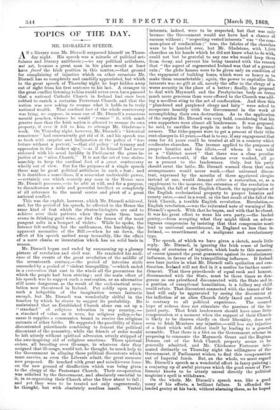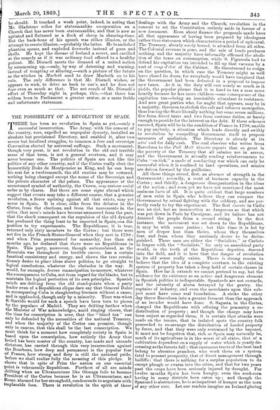TOPICS OF THE DAY.
■■■-•41,■■■•■•
MR. DIST? AELFS SPEECH.
AS a literary man Mr. Disraeli surpassed himself on Thursday night. His speech was a miracle of political artfulness and literary antithesis ;—we say political artfulness, not art, because a great man in his place would at least have faced the Irish position in this matter, that ground for complaining of injustice which on other occasions Mr. Disraeli has so completely and candidly appreciated, but which in the great speech of Thursday night he kept hidden away out of sight from his first sentence to his last. A stranger to the great conflict listening to him would never even have guessed that a national Catholic Church in Ireland had once been robbed to enrich a sectarian Protestant Church, and that the nation was now asking to resume what it holds to be truly national wealth. That cardinal fact of the whole controversy was lying, we suppose, in some one of Mr. Disraeli's numerous mental pouches, whence he would " resume " it, with much greater ease than the Irish nation is allowed to resume its own property, if ever it fell to him to attempt Mr. Gladstone's work. On Thursday night, however, Mr. Disraeli's " historical conscience" had conveniently got rid of it, and his speech was as fresh with surprise and indignation at the policy of " forfeiture without a pretext,"—that old policy "of tyranny and oppression in the darkest akes,"—as if he himself had never enforced with his usual lucidity in Parliament the gross injustice of an " alien Church." It is not the art of true statesmanship to keep the cardinal fact of a great controversy wholly out of view. But for the purposes of a single speech there may be great political artfulness in such a feat ; and it is doubtless a marvellous, if a somewhat undesirable power, —certainly one which scarcely any man in the House save Mr. Disraeli possesses,—to be able at will, and for a purpose, to disembarrass a wide and powerful intellect so completely of all reference to the moral centre and pivot of a great national conflict.
This was the exploit, however, which Mr. Disraeli achieved, and, for the period of his speech, he effected in the House the same kind of feat which the electro-biologists are said to achieve over their patients when they make them taste senna in drinking good wine, or find the fumes of the most pungent salts in a bouquet of violets. While he spoke, the listener felt nothing but the suddenness, the hardships, the apparent anomalies of the Bill ;—when he sat down, the effect of his speech melted away insensibly, like the effect of a mere charm or incantation which has no solid basis in reason.
Mr. Disraeli began and ended by summoning up a gloomy picture of revolution and civil war. He reminded his audience of the events of the great revolution of the middle of the seventeenth century,—the period of intestine strife succeeded by a period of " violent tranquillity,"—which ended in a 2 estoration that cast to the winds all the guarantees for which the people had been striving ; and the main effort of his speech was to suggest such a restoration, or an alternative still more dangerous, as the result of the ecclesiastical revolution now threatened in Ireland. Put coldly upon paper, such a hobgoblin of the imagination seems fantastic enough, but Mr. Disraeli was wonderfully skilful in the touches by which he strove to suggest its probability. He maintained that an Established Church alone can set up a " standard " of religious toleration in any country, a standard of value, as it were, for religious policy,—because it supplies a communion bound to receive the religious outcasts of other faiths. He suggested the possibility of three discontented priesthoods combining to foment the political discontent of the peasantry, while the friends of order would be left utterly without spiritual advocates, utterly stripped of the awe-inspiring aid of religious sanctions. Three spiritual orders, all brooding over ill-usage, to whatever date they assigned that ill-usage, would not, he thought, be much help to the Government in allaying those political discontents which must survive, as even the Liberals admit, the great measure now proposed. He touched with great and mischievous force on the new ground of disaffection which was being given to the clergy of the Protestant Church. Their co-operation was solicited by the Government, and absolutely essential to it, in re-organizing their Cluirch after the blow about to fall ; and yet they were to be treated not only ungenerously, he thought, but with absolutely needless insult. Vested interests, indeed, were to be respected, but that was only because the Government would not have had a chance of success without ; "respecting vested interests " was " the common-place of confiscation ;" true, the fabrics of the churches were to be handed over, but Mr. Gladstone, with 1,504 churches on his hands which he did not know what to do with, could not but be grateful to any one who would keep them from decay, and prevent his being taunted with the remark that " the aspect of regenerated Ireland was that of a general ruin ;" the glebe houses were to be given only on condition of the repayment of building loans, which were so heavy as to make them unmarketable ; again, the power to capitalize lifeinterests was no gift at all, merely the offer to the clergy of a worse security in the place of a better ; finally, the proposal to deal with Maynooth and the Presbyterian body on terms much more generous than were offered to the Church was adding a needless sting to the act of confiscation. And then this "plundered and perplexed clergy and laity" were asked to co-operate heartily with the Government in the work of accomplishing their own destruction. As to the application of the surplus Mr. Disraeli was very bold, considering that hiS own supporters were almost all landowners. It was proposed`, he said, to sacrifice the people in order to bribe the landowners. The tithe-payers were to get a present of their tithe rent-charges in 45 years,—that is to say, if any engagement that runs for 45 years could be trusted at all in a country which confiscates churches. The income applied to the purposes of pauper lunatics and the idiots,—of whom it was told as a " Cabinet secret " that there was a class peculiar to Ireland,—would, if the scheme ever worked, all go• as a present to the landowners. Only, lest his party should covet the bribe, Mr. Disraeli warned them that such arrangements would never work,—that universal discontent, expressed by the mouths of three aggrieved clergies instead of one, would demand either a restoration, or, as a. supplement to the measure, the extension of the revolution to England, the fall of the English Church, the appropriation of the English ecclesiastical property to pauper lunatics and county rates,—and in a word, as the last result of the fall of theIrish Church, a terrible English revolution. Revolution,— English revolution,—was the reiterated note of warning of Mr.. Disraeli's speech. With that he began, and with that he closed.. It was his great effort to wean his own party,—the landed. gentry,—from accepting what they might think an advantageous compromise by insisting that that compromise must.. lead to universal unsettlement, in England no less than in Ireland, — unsettlement of a malignant and revolutionary type.
The speech, of which we have given a sketch, needs little. reply. Mr. Disraeli, in ignoring the Irish sense of lasting wrong, of centuries of injustice, which leads to this measure,. of course ignored the great guarantee against its revolutionary influence, in favour of its tranquillizing influence. If Ireland, sees bare justice in what Mr. Disraeli calls spoliation and confiscation, Ireland will not find in it a motive for further unsettlement. That three priesthoods of equal rank and honour,. disconnected with the State, must be three times as dangerous as one priesthood disconnected with the State and in, a position of exceptional humiliation, is a fallacy any child.
could refute. That discontent connected with the tenure of the land will only be aggravated by seeing the discontent at the infliction of an alien Church fairly faced and removed, is contrary to all political experience. The assured hope of redress does not stimulate the passions of the injured party. That Irish landowners should have some little compensation at a moment when the support of their Church is likely to be thrown chiefly on their liberality, does not seem to Irish Members any injustice,—still less any injustice of a kind which will defeat itself by leading to a general. scramble. That there is a blot on the Government scheme us.
proposing to commute the Maynooth Grant and the Reginut Donum out of the Irish Church property seems to be generally admitted, and Mr. Chichester Fortescue inti mated distinctly on Thursday night the willingness of the Government, if Parliament wishes, to find this compensation out of Imperial funds. But, on the whole, we must regard Mr. Disraeli's speech as a wonderful effort in fancy-painting ; a conjuring up of awful pictures which the good sense of Parliament knows to be utterly unreal directly the political magician's spell is withdrawn.
On the whole, Mr. Disraeli's speech was, like a good many of his efforts, a brilliant failure. It offended the landed gentry at his back, without alarming them, as he hoped he should. It touched a weak point, indeed, in noting that Mr. Gladstone relies for statesmanlike co-operation on a Church that has never been statesmanlike, and that is now as ag,itated and fluttered as a flock of sheep in shearing-time. But the back-bone of his speech was either illusion, or the attempt to create illusion,—probably the latter. He brandished phantom spears, and exploded fireworks instead of guns and shells. He kept the disease of Ireland a secret, and cavilled at the remedy as if it was ordinary food offered to a healthy patient. Mr. Disraeli meets the demand of a united nation by summoning up,—only, by way of deterring and warning, instead of tempting or alluring,—such a picture of the future as the witches in Macbeth used to draw Macbeth on to his ruin. The only difference is that Mr. Disraeli wishes, or appears to wish, to drive us back to our's, and he does not hope even as much as that. The net result of Mr. Disraeli's effort of Thursday night is, perhaps, this,—that there has seldom been in Parliament a greater orator, or a more feeble and unfortunate statesman.



































 Previous page
Previous page